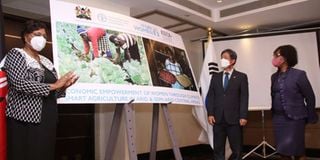Sh700 million to enrich women in farming

What you need to know:
- A total of 2,400 women farmers will benefit from the United Nations four-year project.
- In Kenya, women account for 75 per cent of the labour force in smallholder agriculture.
- The project is set to go a long way in enhancing women's economic empowerment, food security, gender equality and job creation.
A total of 2,400 women farmers will benefit from the Food and Agriculture Organisation of the United Nations (FAO) and UN Women’s $5million (Sh700 million) project funded by the Korea International Corporation Agency (KOICA).
The four year project (2020-2023) is aimed at strengthening women’s capacity to meaningfully engage in Climate Smart Agriculture (CSA) in three arid and semi-arid lands (ASAL) counties of Laikipia, West Pokot and Kitui.
The project, which was officially launched in Nairobi this week will also see12,000 family members and people indirectly benefit once fully implemented.
Korea Ambassador to Kenya Choi Yeonghan said the CSA project will ensure the 2,400 beneficiary - which include both women and men - will achieve economic progress that will sustain beyond the project, with impact-orientated activities and monitoring.
Comparative advantage
KOICA supports agriculture and food security, among other areas, with the aim of reflecting Korea’s comparative advantage, while at the same time corresponding to the SDGs, as well as the priority for the development of our partner countries,” said Mr Yeonghan.
The ambassador added that KOICA Kenya strives to establish a sustainable basis of food value chain; improve people’s living environment; and push forward with inclusive and sustainable regional development in a bid to improve the welfare of the rural community in the country.
“As change drivers, KOICA works towards realising the social value globally in collaboration with the UN agencies and other partners,” he added.
The criteria for selection of these counties included; vulnerability to climate change; agricultural productivity; poverty levels; social norms and beliefs that hinder women’s equal participation in the economic, social, political, and decision-making spheres (Gender Inequality Index); and engagement of other stakeholders, to avoid duplication.
“We recognise that food security starts and ends with women, who account for 60 to 75 per cent of the labour force in smallholder agriculture in Kenya, as well as in many other countries in Africa. It is therefore very crucial to leave no one behind in the quest to attaining food and nutrition security for all,” said FAO representative to Kenya Ms Carla Mucavi during the event.
The project seeks to promote an approach to agricultural transformation in a changing climate in Kenya's ASAL regions that ensures gender-sensitive responses to climate change and to resilience building.
Economic empowerment
Within the four year period, the project will increase the technical know-how of farmers on CSA approaches, unlock market driven value-chains for women and improve their capacity to participate in productive land and water management, as well as increase the women in agribusiness’ access to finance.
“Women’s economic empowerment is central to achieving gender equality. It is therefore paramount that, in a country where women feature so heavily in the agriculture sector, related programs support women,” said UN Women Country Representative to Kenya, Ms Anna Mutavati.
She added that women are disproportionately affected by overlapping challenges of poverty and food insecurity caused by floods, droughts, locusts and now Covid-19 pandemic.
“Incorporating climate smart approaches will contribute to building women’s resilience, self-reliance and economic security,” she said,
Gender Cabinet Secretary Prof Margaret Kobia lauded the project adding that economic empowerment for women is the way to go.
The CS noted that the project will go a long way in enhancing women's economic empowerment, food security, gender equality and job creation.
She added that poverty is the main cause of problems facing women and girls among them Sexual and Gender Based Violence (SGBV), teenage pregnancies and drug abuse.
“Empowering women has the greatest impact to uplift a community. When women are empowered, families and communities are empowered,” said Prof Kobia.
In Kenya, women account for 75 per cent of the labour force in smallholder agriculture, manage 40 percent of small farms, and play a major role in food preparation and storage.
Food security
Women in the country face myriad of challenges among them a lack of capital and resources to venture into agri-business.
The chairperson of the Association of Women in Agriculture, Ms Judy Matuc emphasised on the need to focus on empowering small-scale women farmers saying 60 per cent of food eaten in the country passes through the hands of women farmers.
“There is need to put our efforts, focus and resources in the hands of small-scale women farmers as they play an important role in ensuring food security in the country,” said Ms Matu.
She appealed to the National government and county governments through Council of Governors (CoG) to support the continuity of the programme in all the ASAL counties.
Agricultural production remains the main source of income for most rural communities, and the increased risk of crop and livestock production failure, associated with increased frequency of extreme climate events, poses a major threat to food security and poverty reduction.
Adaptation of the agricultural sector to the adverse effects of climate change is thus an important priority, to protect and improve the livelihoods of the poor and to ensure food security.
With little resilience to climatic changes, economic and social shocks, smallholder farmers in ASAL counties have become extremely vulnerable to food insecurity.
In addition to that, climate change increases the uncertainty as most of the households are unaware of the fast-changing environment.





